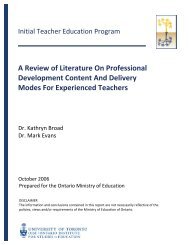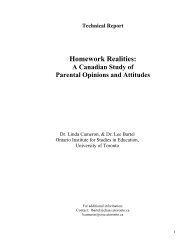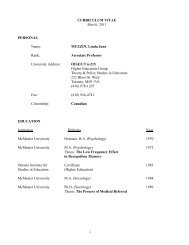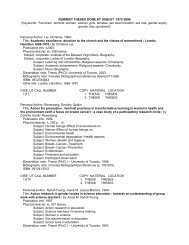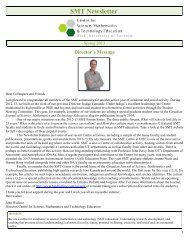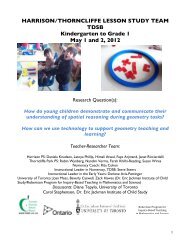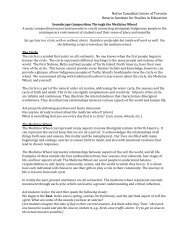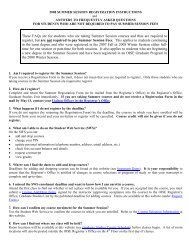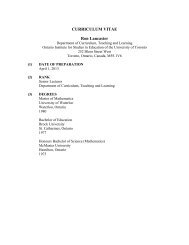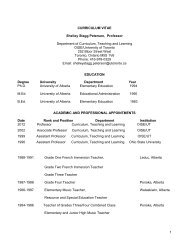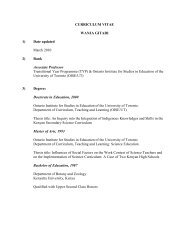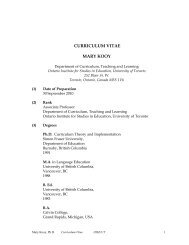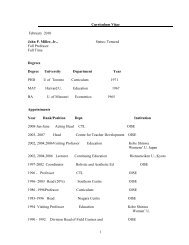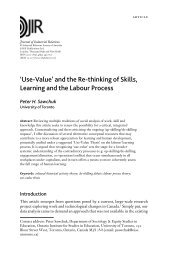The Ontario Curriculum, Grades 9-12 - Ministère de l'éducation ...
The Ontario Curriculum, Grades 9-12 - Ministère de l'éducation ...
The Ontario Curriculum, Grades 9-12 - Ministère de l'éducation ...
You also want an ePaper? Increase the reach of your titles
YUMPU automatically turns print PDFs into web optimized ePapers that Google loves.
ENGLISH, GRADES 9 AND 10 (2007) AND GRADES 11<br />
AND <strong>12</strong> (2007)<br />
See the Preface for important information on the organization of the following material.<br />
Although none of the expectations in the English curriculum explicitly addresses environmental<br />
education, in each of the strands in the various courses the <strong>de</strong>velopment of environmental<br />
un<strong>de</strong>rstanding can be fostered through both the learning context (e.g., a topic, thematic unit, or<br />
issue related to the environment) and learning materials (e.g., books, websites, media).<br />
In all courses in the English curriculum, stu<strong>de</strong>nts are encouraged “to look beyond the literal<br />
meaning of texts and to think about fairness, equity, social justice, and citizenship in a global<br />
society” (see the section “Instructional Approaches” in the front matter of both the Gra<strong>de</strong> 9–10<br />
and 11–<strong>12</strong> policy documents). In addition to the opportunities to explore environmental issues<br />
affor<strong>de</strong>d by this approach, stu<strong>de</strong>nts acquire literacy skills, including skills related to research and<br />
inquiry, that support the <strong>de</strong>velopment of environmental literacy (see the section “Literacy,<br />
Mathematical Literacy, and Inquiry/Research Skills” in the front matter of the policy<br />
documents).<br />
In many cases, when global, historical, political, social, and/or economic issues are referred to in<br />
the expectations (especially when they are connected to Aboriginal perspectives), the inclusion<br />
of environmental topics would be a logical extension and would help stu<strong>de</strong>nts appreciate the<br />
scope of the impact that the environment has on their world.<br />
English, Gra<strong>de</strong> 9, Applied (ENG1P)<br />
Media Studies<br />
3.1 <strong>de</strong>scribe the topic, purpose, and audience for media texts they plan to create (e.g., a<br />
storyboard for a music vi<strong>de</strong>o to raise money for an environmental cause; the outline for a<br />
radio broadcast over the school PA system to commemorate a famous Canadian) and<br />
i<strong>de</strong>ntify challenges they may face in achieving their purpose<br />
Note: One of the examples in this expectation illustrates how environmental connections can be<br />
ma<strong>de</strong> through the choice of the topic and purpose of the media texts stu<strong>de</strong>nts are expected to<br />
create. A similar approach can be adopted in expectations in the Writing strand, with respect to<br />
pieces of writing stu<strong>de</strong>nts are expected to produce.<br />
68 Environmental Education, <strong>Gra<strong>de</strong>s</strong> 9−<strong>12</strong>: Scope and Sequence of Expectations, 2011



